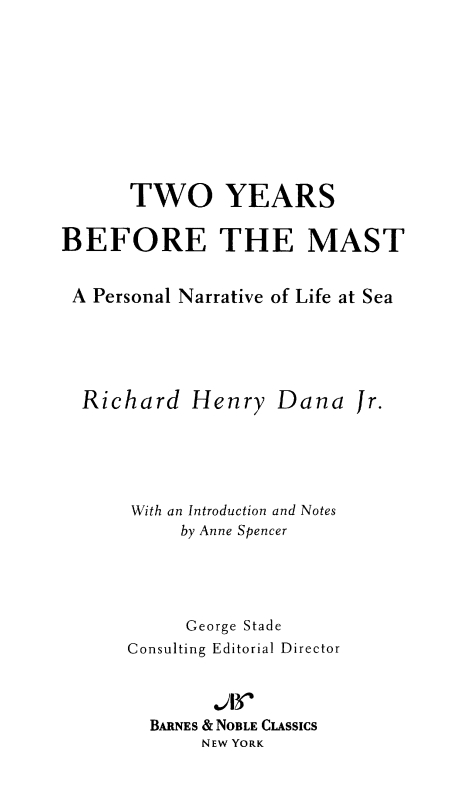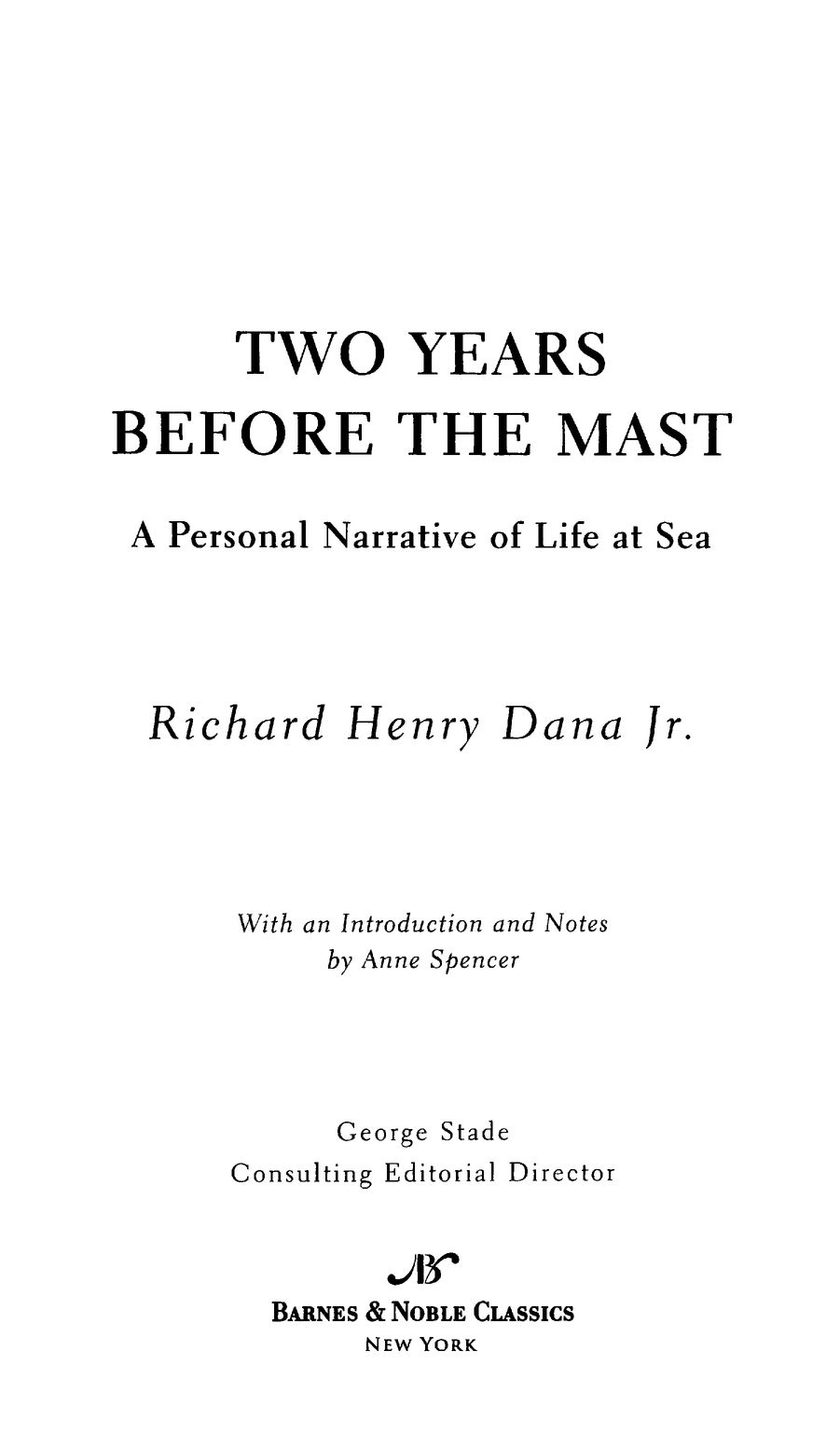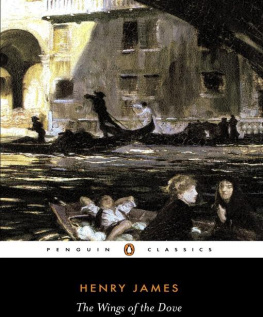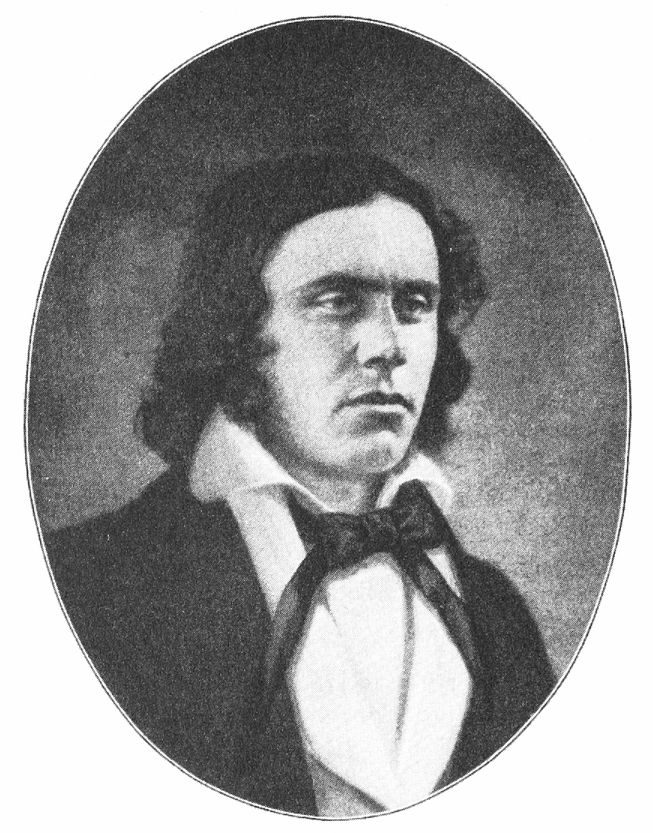
Table of Contents
From the Pages ofTwo Years Before the Mast
In the following pages I design to give an accurate and authentic narrative of a little more than two years spent as a common sailor, before the mast, in the American merchant service.
(page 4)
There is not so helpless and pitiable an object in the world as a landsman beginning a sailors life.
(page 9)
However much I was affected by the beauty of the sea, the bright stars, and the clouds driven swiftly over them, I could not but remember that I was separating myself from all the social and intellectual enjoyments of life. Yet, strange as it may seem, I did then and afterwards take pleasure in these reflections, hoping by them to prevent my becoming insensible to the value of what I was leaving.
(page 11)
The second-mates is proverbially a dogs berth. He is neither officer nor man.
(page 16)
Six days shalt thou labor and do all thou art able,
And on the seventhholystone the decks and scrape the cable.
(page 20)
A sailors life is at best but a mixture of a little good with much evil, and a little pleasure with much pain. The beautiful is linked with the revolting, the sublime with the commonplace, and the solemn with the ludicrous.
(page 41)
The Californians are an idle, thriftless people, and can make nothing for themselves.
(page 78)
What is there for sailors to do? If they resist, it is mutiny; and if they succeed, and take the vessel, it is piracy. If they ever yield again, their punishment must come; and if they do not yield, they are pirates for life.
(page 103)
RICHARD H. DANA JR., IN 1842

Richard Henry Dana Jr.
Richard Henry Dana Jr. was born on August 1, 1815, into a prominent, affluent family in Cambridge, Massachusetts; his father was an editor and critic, and his grandfather had served as the states chief justice. The young man enrolled in Harvard College in 1831. At the beginning of his junior year, a severe case of measles damaged his eyesight, making study impossible. He returned home to recuperate but soon became bored with the tedium of bed rest; told that sea air could help restore his eyesight, Dana set off on an adventure.
A young man of his station would typically travel as a passenger on a well-appointed ship, perhaps dining with the officers; instead, in August 1834 Dana joined the crew of the brig Pilgrim as an ordinary seaman. Throughout his tenure as a merchant sailor, Dana kept a journal to which he applied his significant powers of observation and gift for descriptive storytelling. Aboard the 85-foot Pilgrim, he rounded treacherous Cape Horn at South Americas southern tip and sailed to the sparsely settled Mexican territory of California. As the Pilgrim put into various ports, including Santa Barbara, Monterey, and San Diego, Dana chronicled in detail the daily lives of his fellow sailors. In 1836 he returned to Cambridge, this time aboard the merchant ship the Alert.
His eyesight fully recovered, Dana completed his undergraduate degree and entered Harvard Law School; meanwhile, he organized his notes into a full-length travel narrative, Two Years Before the Mast (1840). In addition to being a colorful account of a lively adventure, the widely read book offers a unique perspective on the working life of the eras common sailor, including the everyday hardships he endured.
Dana devoted the rest of his life to the practice of law, especially maritime law and advocacy of the rights of sailors. In 1841 he published The Sailors Friend, a guide to the duties and legal rights of seamen. He helped found the Free-Soil Party and, following the Fugitive Slave Law of 1850, offered legal counsel to runaway slaves at no charge.
In 1859 Danas health began to decline, and he once again took to the sea, this time as a passenger on an around-the-world voyage. In the essay Twenty-four Years After, written during his second visit to California, he recounted the changes that had taken place there since his first visit. Starting in 1869, the essay was added as an afterword to editions of Two Years Before the Mast.
After Abraham Lincoln was elected U.S. president, Dana was appointed as Massachusetts district attorney, and he successfully argued an important case before the U.S. Supreme Court. In 1867 he served in the Massachusetts legislature and participated in the trial of Confederate president Jefferson Davis. Dana soon returned to private practice and in the ensuing decade concentrated on international law, in which he had become an expert. His commentary in an edition of Henry Wheatons seminal Elements of International Law (1866) sparked allegations of plagiarism, and the ensuing lawsuit helped obstruct Danas 1876 nomination as ambassador to Britain.
In 1878 Dana left his private practice in order to travel, study, and write. He journeyed to Europe and, soon after arriving in Rome, caught a deadly case of pneumonia. On January 6, 1882, Richard Henry Dana Jr. died in Rome.
The World of Richard Henry Dana Jr. andTwo Years Before the Mast
| 1815 | Richard Henry Dana Jr. is born on August 1 in Cambridge, Massachusetts, into a family with distinguished roots in Massachusetts; his grandfather, Francis Dana, was chief justice of the Supreme Court there for fourteen years. |
| 1817 | American writer and philosopher Henry David Thoreau is born. |
| 1820 | The U.S. Congress passes the Missouri Compromise, temporarily maintaining the balance between free and slave states; the act allowed Maine to enter the Union as a free state and Missouri as a slave state. |
| 1830 | American poet Emily Dickinson is born. |
| 1831 | Dana begins his first year at Harvard College. Edgar Allan Poe publishes Poems. Nat Turner leads a slave revolt in Virginia. |
| 1833 | Suffering from weak eyesight brought on by measles, Dana leaves Harvard to convalesce. |
| 1834 | Impatient with bed rest and told that a sea voyage would help restore his eyesight, Dana joins the crew of a merchant ship, the Pilgrim, bound for California by way of Cape Horn; he ships out of Boston on August 14. |
| 1835 | In January the Pilgrim arrives at Santa Barbara, California; for more than seven months the crew works at ports up and down the coast, collecting and loading cattle hides and tallow onto the ship. |
| 1836 | His eyesight restored, Dana returns from his two-year voyage, making the trip from California to Boston aboard the Alert; he reenters Harvard College. American philosopher and essayist Ralph Waldo Emerson publishes the philosophical treatise Nature. |
| 1837 | Dana graduates from Harvard College and enters Harvard Law School. American novelist, editor, and critic William Dean Howells is born. |
| 1840 | Two Years Before the Mast, Danas chronicle of his journey aboard the Pilgrim and the Alert, is published. Dana graduates from Harvard Law School and opens an office in Boston. |








